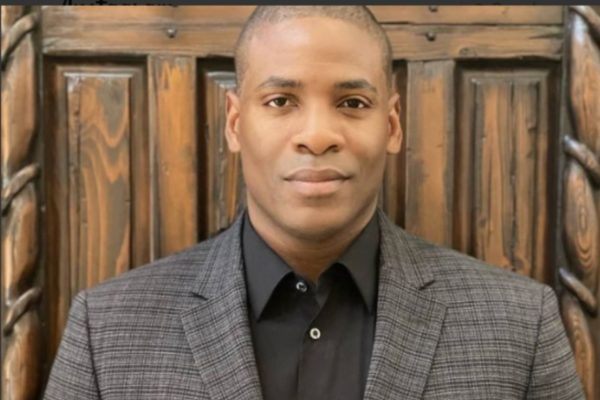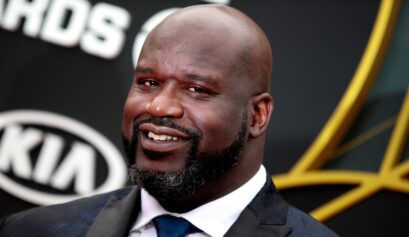Who hasn’t heard a story about a professional athlete with a multi-million contract who ends up destitute just a few years later?
Sixteen percent of NFL players go bankrupt within 12 years of retirement, found a study from the National Bureau of Economic Research. And, 70 percent of the NFL is made up of Black players, but very few of them have the financial freedom they need to survive in retirement. Former NFL star turned financial advisor Adewale Ogunleye wants to change that statistic and empower athletes to manage their money better.

As a financial advisor, Ogunleye says he knows Black athletes want to build wealth, but just don’t have the tools to do so. He’s helping empower African-Americans to have more education to build wealth to pass on to future generations.
Ogunleye is also the host of the TV show “Front Office, ” in which the world’s top athletes evaluate business pitches from entrepreneurs. “Front Office” is a joint venture between PlayersTV and UBS and started airing on Nov. 14.
From NFL Player to Financial Advisor
As a former NFL player, Ogunleye noted to USA Today that he had to make a loan to a fellow athlete who earned more than he did.
“I’m looking at this guy thinking, ‘I’m undrafted. I only had a rookie minimum salary and you’re asking me for a loan?’ And I was actually in a position where I could give them a loan. And so that’s where I realized there’s a problem,” said Ogunleye.
The average NFL player’s salary is $660,000, according to the NFL’s collective bargaining agreement. However, Ogunleye noted to Yahoo that even a large salary like that may not last because many players don’t learn about finance management in their youth. Ogunleye admits he didn’t know how to manage money when he was drafted into the NFL.
“You know, it’s hard when you’ve come from a place. You know, I was born and raised in New York City, parents were immigrants from Nigeria. And signing that big contract was, you know, you felt like you’ve made it. But the truth of the matter is, that’s actually where a lot of the headaches start to happen, and not understanding what your finances are,” said Ogunleye.
“I’d say this all the time, but not even understanding what a basis point was. And you couldn’t tell me I wasn’t intelligent. I had a four-year degree from Indiana University. I played in the NFL for 11 years. I was captain, I went to the Super Bowl. I knew defenses in and out, I knew offenses in and out. But for some reason — and which we know probably what it was — I just wasn’t raised with the ability of people around me that could teach me about my finances,” said Ogunleye.
Ogunleye went back to school and got his MBA from George Washington University to learn more about finance. He also went back to school to teach athletes financial literacy.
“But for that reason, I’d risked those $34 — those millions of dollars that I had, I’d risked that by not having the right knowledge. So I went back to school, got my MBA, so I could understand the basics of finance. And I realized that the industry has done a poor job of actually working with these athletes, these people who have brought joy and good times and family gatherings together, through understanding what finances are,” said Ogunleye.
After getting his MBA, Ogunleye is now head of UBS Global Wealth Management’s Sports and Entertainment division.
Athletes Often Lose Money Because of Family Obligations, Lack of Financial Education
Even when athletes make large sums of money, they often lose it for myriad reasons. One reason that athletes lose their wealth is that they often have very little time to increase their wealth. According to USA Today, the average NFL player’s career only lasts around four years. In addition to a short career, many athletes are the first in their families to have wealth. They often feel an obligation to help their many family members.
Walter Stith is a former NFL player and a current financial advisor at Morgan Stanley’s Global Sports and Entertainment division. He told USA Today that few athletes can keep their money because they feel they need to financially support their family and friends.
“I wouldn’t necessarily say that it’s a temptation when it comes to wealth disappearing. I would say it’s more about obligation. Most of these athletes feel that they are obligated to help friends and family and it creates an issue. Financial literacy as a whole needs to be put as a priority in our educational system, especially in dealing with Black wealth and Black entrepreneurship,” said Stith.
UBS Launched Program to Help Black Students Build Black Wealth
As part of an effort to teach athletes about financial literacy, Ogunleye and his current employer UBS offered financial education to Historically Black Colleges and Universities. Ogunleye gave advice to Black students this past October in the “Elevate! Creating and Preserving Black Wealth” virtual program to students at 14 schools in the Southern Collegiate Athletic Conference.
According to SCAC Commissioner Greg Moore, advisors like Ogunleye can help Black students build wealth and close the Black-White wealth gap. Many of the states in the SCAC have many residents below the poverty line. The 2020 census noted that about 16 percent of Alabama residents live in poverty.
“Income inequality presents an existential threat to individuals looking to pursue the American Dream and future wealth creation. Unfortunately, within the African-American community, these challenges are even more acute,” Moore told USA Today.
“Historically Black Colleges and Universities, that graduate and train the largest number of black professionals, can play a critical role in the efforts to close the income gap,” added Moore.
Ogunleye Wants Financial Advisors to Help Athletes Build Legacy of Wealth
Ogunleye wants financial literacy to be an integral part of Black athletes’ lives while they’re actively playing to build intergenerational wealth once they retire.
“All over, from the athletes to the agents, to the financial advisors, to financial institutions, to the leagues, they all should do a better job of making sure that the right resources are falling in the hands of these athletes and entertainers so that they’re able to affect people in the way that they want to, have positive impact, and also create legacy for their families, so that there’s not this stigma of money within these communities that these athletes come from,” Ogunleye told Yahoo.
Ogunleye would like financial advisors to take interest in athletes and how they want to give back financially to their communities. Financial advisors should deal with the goals of the athlete not just the athlete’s money.
“It’s too transactional. It’s too ‘Oh my goodness, look at Patrick Mahomes’ contract, I wish I was his financial advisor.’ It should be more like, ‘Wow look at Patrick Mahomes’ contract. I wonder what he wants to do moving forward. I wonder who he wants to help,’ ” Ogunleye told Business Insider.
He also feels it helps to have financial advisors who can relate to these young Black athletes.
“FAs [financial advisors) can’t say, ‘I don’t like dealing with athletes because they have these posses or this ecosystem around them where there’s just too many people hanging on,’ ” Ogunleye continued. “Well, if you knew what these gentlemen came from, you could empathize with what’s going on. Maybe now you can deliver a plan to help.”




